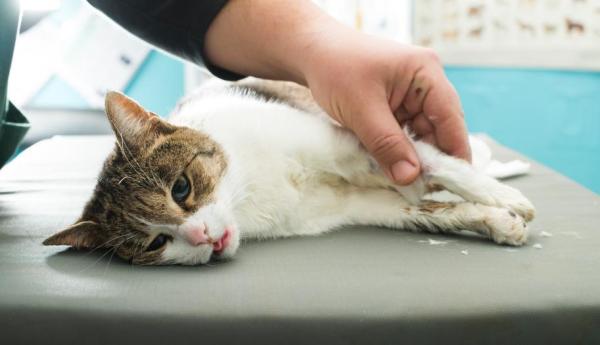As a cat owner, your cat’s health is your top priority. But how can you tell if your feline friend is getting all the nutrients they need to stay healthy and happy? Malnutrition is a serious condition that can affect cats of all ages, and it’s important to know the signs and symptoms so you can take action before it’s too late. In this article, we’ll explore the signs of malnutrition in cats, the causes, and what you can do to prevent it.

Cats are independent animals and can be very picky eaters, which can make it challenging for pet owners to ensure they’re getting all the nutrients they need. Malnutrition occurs when your cat is not getting the essential nutrients they need to thrive. This can lead to a variety of health issues, from a dull coat to more serious illnesses.
What is Malnutrition in Cats?
Malnutrition occurs when a cat’s diet is deficient in essential nutrients such as protein, vitamins, and minerals. When a cat’s body lacks these nutrients, it can affect their overall health, growth, and development.
Malnutrition can occur in cats of all ages, but it is more common in older cats who may have difficulty eating or digesting food.
Causes of Malnutrition in Cats:
There are several reasons why a cat may become malnourished, including:
- Inadequate diet: Feeding your cat a diet that is lacking in essential nutrients can lead to malnutrition.
- Poor appetite: Cats can be finicky eaters and may refuse to eat certain foods, leading to a lack of essential nutrients.
- Digestive problems: Cats with digestive problems may have difficulty absorbing nutrients from their food.
- Illness or disease: Certain illnesses and diseases can affect a cat’s ability to absorb and use nutrients properly.
- Dental problems: Cats with dental problems may have difficulty chewing their food, leading to a lack of essential nutrients.
Signs and Symptoms of Malnutrition in Cats:
It’s important to know the signs and symptoms of malnutrition in cats so you can take action before it’s too late. Some common signs of malnutrition in cats include:
- Dull or dry coat
- Weight loss
- Lethargy
- Lack of appetite
- Vomiting or diarrhea
- Poor muscle tone
- Weakness
If you notice any of these signs in your cat, it’s important to take them to the vet right away.
How to Prevent Malnutrition in Cats:
Preventing malnutrition in cats is all about ensuring they’re getting the essential nutrients they need. Here are some tips to help you prevent malnutrition in your feline friend:
Understanding Your Cat’s Nutritional Needs:
Cats are obligate carnivores, which means they need a diet that is rich in protein. They also require certain vitamins and minerals to stay healthy. Understanding your cat’s nutritional needs is the first step in preventing malnutrition.
Feeding Your Cat a Balanced Diet:
Feeding your cat a balanced diet is essential to their overall health. This means ensuring they’re getting enough protein, vitamins, and minerals. It’s important to feed your cat a diet that is appropriate for their age, weight, and activity level.
Choosing the Right Cat Food:
Choosing the right cat food can be overwhelming, with so many options on the market. Look for a high-quality, well-balanced cat food that meets your cat’s nutritional needs. Avoid foods that contain fillers, artificial preservatives, and flavors.
Adding Supplements to Your Cat’s Diet:
Adding supplements to your cat’s diet can help ensure they’re getting all the essential nutrients they need. Speak to your vet about which supplements are right for your cat, as some can interact with medications or have side effects.
The Importance of Regular Vet Check-ups:
Regular vet check-ups are important for monitoring your cat’s health and detecting any potential issues before they become serious. Your vet can also provide advice on your cat’s diet and recommend any necessary supplements.
Conclusion:
Malnutrition in cats is a serious condition that can have serious consequences. By understanding your cat’s nutritional needs and taking steps to ensure they’re getting all the essential nutrients they need, you can help prevent malnutrition and keep your feline friend healthy and happy.
FAQs:
What should I do if I suspect my cat is malnourished?
If you suspect your cat is malnourished, take them to the vet right away. Your vet can perform a physical exam and run diagnostic tests to determine if your cat is malnourished and recommend a treatment plan.
How can I tell if my cat is getting enough protein?
Look for a high-quality cat food that contains animal-based protein sources, such as chicken, fish, or turkey. You can also speak to your vet about your cat’s protein needs.
Can malnutrition be reversed in cats?
In some cases, malnutrition can be reversed with proper treatment and nutrition. However, in severe cases, the effects of malnutrition may be permanent.
What should I do if my cat has dental problems that make it difficult to eat?
Speak to your vet about dental care for your cat. They may recommend a special diet or dental treatment to help your cat chew their food properly.
Can supplements interact with my cat’s medication?
Some supplements can interact with medications, so it’s important to speak to your vet before adding any supplements to your cat’s diet. Your vet can recommend supplements that are safe for your cat to take.
